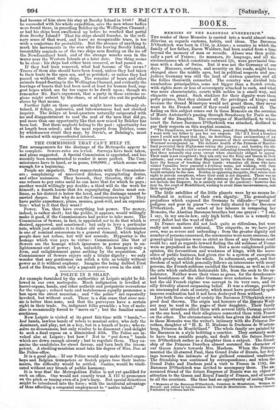A POLICE IN B SHARP.
AN example furnished by the authorities at Leipzic might be fol- lowed in our own metropolis. Much indignation is levelled at barrel-organs, bands, and other *esthetic and peripatetic recreations for the vulgar ; refined taste and tastelessness equally pronounce a ban upon the street musician; and "the police" are repeatedly invoked, but without avaiL There is a dim sense that some mu- sic is better than none, and that the purveyors have a certain right in their trade. So, indignant folks grumble; a box of melo- dies is occasionally forced to "move on " ; but the familiar sound oontinnes.
• Now Leipzic is visited at its great fair-time with " bands,"— iad bands, lawless bands of rebels to musical order, who defy the dominant, and play, not in a key, but in a bunch of keys ; who re- solve no dissonances, but only resolve to be dissonant ; and.delight
• to seek a final repose on a diminished fifth. The Police are in- voked also at Leipzic ; but how ? Not to "put down" bands which are down enough already ; but to regulate them. They ex- amine the candidates for street favour, and turn back the incom- petent. A strolling musician must take his degree of Mus. Doc. at the Police-office.
It is a good plan. If our Police would only make barrel-organ- boys and Belgian trumpeters or Scotch pipers tune their instru- ments, the difficulty would be settled. Tustice. would be vindi-
cated without any breach of public i harmony. It is true that the Metropolitan Police s not yet qualified for such an office. One would not exactly trust X 147 to pronounce on the pitch or tuning even of a jew's-harp. But special detectives might be introduced into the force; with the incidental advantage of thus affording a congenial employment to "native talent."


























 Previous page
Previous page